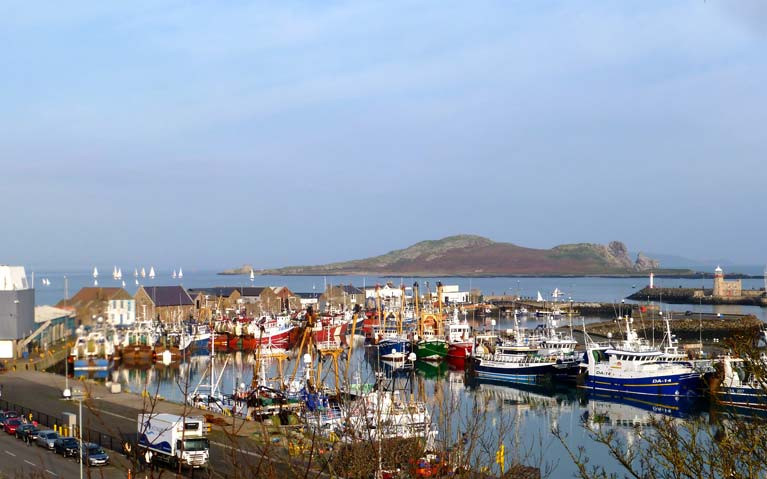Displaying items by tag: Dept of Marine
With Storm Ciara battering the country on this General Election day to remind us all of who is really the boss in Ireland during an average February, it’s timely to reflect on the longterm effect of the choices we make when faced with the ballot paper. And it’s useful to remember that we should be very careful about what we genuinely wish for, as in time it may come back to haunt us.
Just over a week ago, Afloat.ie carried this very telling if highly personalised analysis of the various party manifestos as the election campaigns accelerated, and as it’s efficiently brief it surely deserves a second appraisal now.
Basically, the Afloat.ie writer asserts that we should think of resurrecting the stand-alone Department of the Marine, which was instituted by Taoiseach Charlie Haughey TD on March 19th 1987. It became the Department of Marine & Natural Resources on 12th July 1997, sank into being the Department of Communications, Marine & Natural Resources in 2002, and in 2007 the much-reduced Marine element was booted out to disappear altogether into the Department of Agriculture and Food, its ship and boat-related aspects having been transferred to wherever Transport had found itself some sort of home.
To add to the gloom, in the following year the Sail Training Brigantine Asgard II sank - seemingly never to be replaced by government initiative - and by 2009 Ireland and her economy were going to hell on a handcart which wouldn’t have passed the NCT, let alone any seaworthiness test.
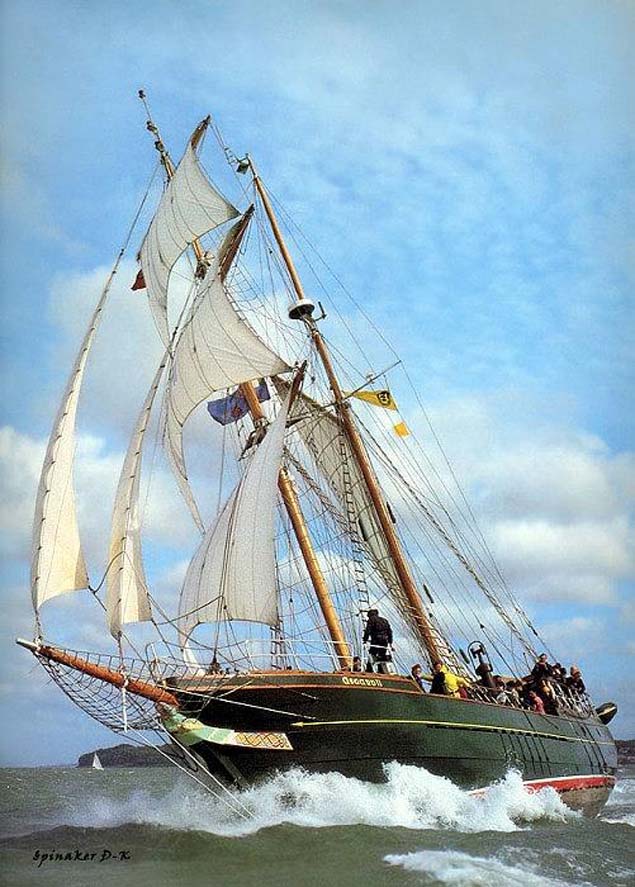 The Sail Training Brigantine Asgard II in fine sailing form. Her design and construction by Tyrell of Arklow was confirmed by Minister for Defence Patrick Donegan TD in March 1973, and she was finally completed with the support of Taoiseach Charles Haughey TD in March 1981. But after her loss in September 2008 (when her hull was already overdue for renewal), it eventually became clear that any replacement Irish sail training vessel would not be a government project.
The Sail Training Brigantine Asgard II in fine sailing form. Her design and construction by Tyrell of Arklow was confirmed by Minister for Defence Patrick Donegan TD in March 1973, and she was finally completed with the support of Taoiseach Charles Haughey TD in March 1981. But after her loss in September 2008 (when her hull was already overdue for renewal), it eventually became clear that any replacement Irish sail training vessel would not be a government project.
For any outside observer considering this governmental behavioural pattern in a self-proclaimed island nation, the weird story of the short life and death of the Department of the Marine must be bewildering, to say the least. To begin to understand it, we have to accept that most Irish people have a very hesitant relationship with the sea. It’s an inherited bad memory. None of our ancestors ever walked to Ireland, and while some got here on their primitive boats, there were folk memories passed down the generations of thousands who perished on the attempted voyage.
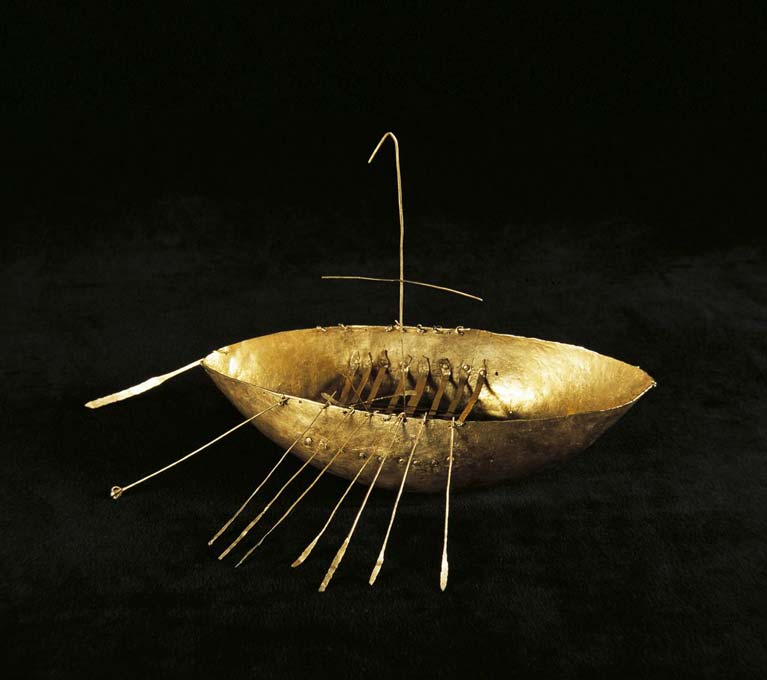 The model of the Broighter boat in the National Museum – it survives from c100BC, and was found near Limavady in County Derry in 1896. Folk memories of the dangers of mankind first trying to reach Ireland in even more primitive craft ten thousand years earlier shaped the attitude to the sea and seafaring of subsequent generations.
The model of the Broighter boat in the National Museum – it survives from c100BC, and was found near Limavady in County Derry in 1896. Folk memories of the dangers of mankind first trying to reach Ireland in even more primitive craft ten thousand years earlier shaped the attitude to the sea and seafaring of subsequent generations.
Thus the few surviving early Irish staggered ashore to find themselves in a land of potential plenty, with nearly all the new arrivals abandoning any notion of subsequent seafaring - just as the original Berber inhabitants of the Canary Islands, the Aboriginals in Australia, and the Maoris in New Zealand have done.
In Ireland, it’s an atavistic anti-maritime memory which is only slowly being erased, and it contrasts vividly with our attitude to aviation. For an island nation today relies as much on aviation as it does on seafaring. Yet far from having mixed feelings about air travel and transport in the way that we think about the sea and seafaring, on the contrary we Irish are world leaders in flying enthusiasm and aircraft management development. After all, it hasn’t drowned us in thousands. And it has served us so well that we send forth people like Michael O’Leary and Willie Walsh and dozens of others to spread the word and bring aviation business to Ireland.
But the sea, the sea……it’s so very different. There’s no escaping the fact that most of us like to be within reasonable distance of it - half of us live within five kilometres - and as you traverse those five kilometres towards the coast in any seaside conurbation in Ireland, you soon appreciate that the closer to the water – or at least to a good view of it – then the more desirable the property.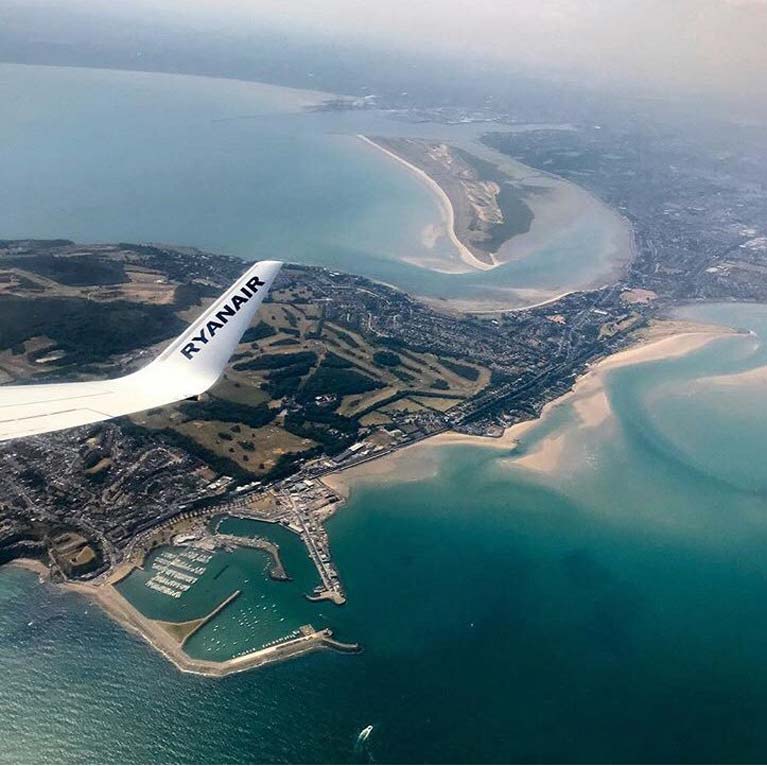 The entire conundrum of Ireland’s relationship with the sea is summed up in this photo of Howth Harbour and the Sutton Peninsula from a Ryanair jetliner. Most people now travel to and from the island by air, yet if at all possible they prefer to live near the sea. As for Howth Harbour, with so much sand to the westward, inevitably it is prone to silting with every ebb tide. But unlike The Netherlands, where all harbours are routinely dredged every five years, the 1982-completed modern Howth Harbour is due to see its first major dredging – under the aegis of the Office of Public Works – get under way this year.
The entire conundrum of Ireland’s relationship with the sea is summed up in this photo of Howth Harbour and the Sutton Peninsula from a Ryanair jetliner. Most people now travel to and from the island by air, yet if at all possible they prefer to live near the sea. As for Howth Harbour, with so much sand to the westward, inevitably it is prone to silting with every ebb tide. But unlike The Netherlands, where all harbours are routinely dredged every five years, the 1982-completed modern Howth Harbour is due to see its first major dredging – under the aegis of the Office of Public Works – get under way this year.
But living near the sea and interacting with it (other than by having the occasional swim) are two different things altogether. We like the sea as an agreeable and healthy background, we like to see boats on it in the summer as they add a bit of interest and colour, but please don’t ask us to take it so seriously that we should have a specific Department of the Marine. And while fishing boats are pretty in sunshine, please don’t ask us to eat fish more than once a week, and please please don’t ask us to consider the challenges of the sometimes very dangerous job which is sea fishing.
As for sailing on the sea for recreation, except where there’s an Olympic medal involved it’s not for the likes of us – as far as many people in Ireland are concerned, it’s only for the very rich, an elitist activity which should more properly be reported in the Social Pages or the Business Analysis than in the Sports Section…….
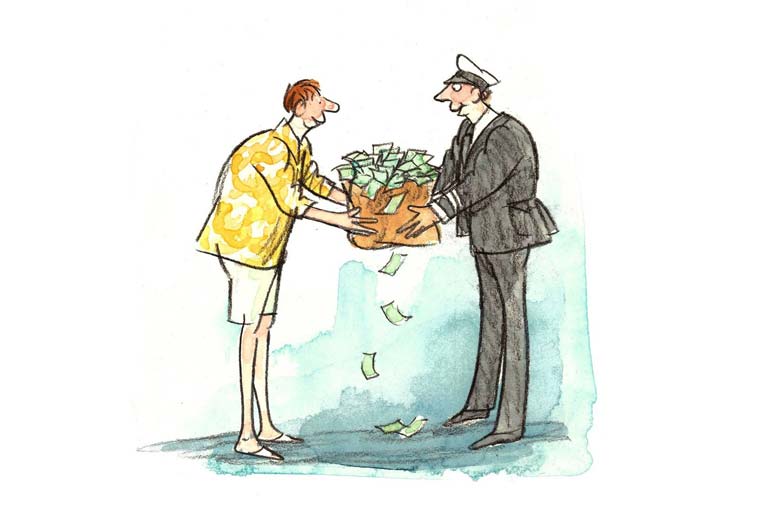 Popular perceptions of the sailing community tend to think first of the money involved……..
Popular perceptions of the sailing community tend to think first of the money involved……..
All of which means that, one way or another, in the popular mind the optics of the sea and seafaring aren’t good. At General Election time, the only votes to be found in the maritime sphere are from those directly involved, and they’re not enough to swing seats.
We need to face it - our fellow non-sailing non-seafaring citizens think we’re a very odd bunch indeed, suffering from tunnel vision in our obsession with large and small ships and the sea and waterways they sail on, an obsession which is completely at odds with Ireland at large.
So much so, in fact, that a Government department specifically devoted to our needs is regarded as political death among politicians, and a career backwater in the Civil Service, both of whom damned the original Department of the Marine in 1987 by dismissing it as “The Ministry for Fish and Ships”. How we laughed.
Thus for the time being, the re-establishment of a Department of the Marine would probably be premature. But be not depressed, good people of the sea. Things are moving in the right direction anyway, and perhaps we can do it better almost as a branch of private enterprise, rather than as yet another cumbersome and sneered-at Government department with its extra layers of bureaucracy.
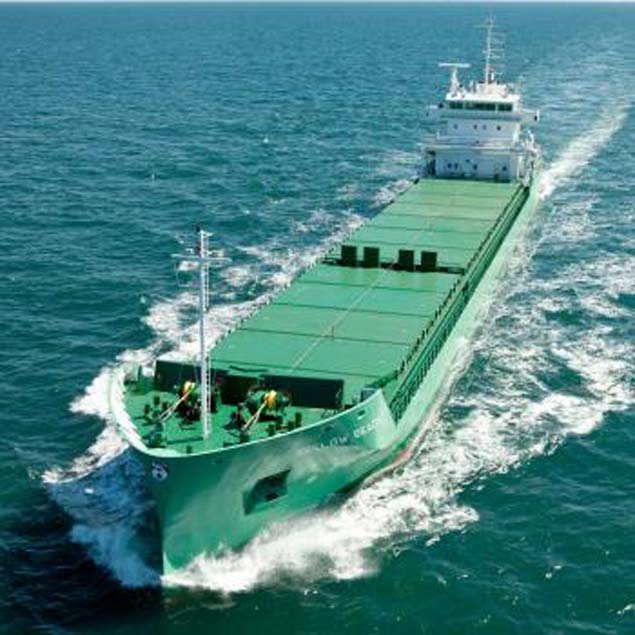 Getting on with it. Arklow Shipping’s Arklow Beach busy at her work.
Getting on with it. Arklow Shipping’s Arklow Beach busy at her work.
After all, think of the successful maritime enterprises which are steadily developing in a healthy way, yet if they think we need a designated Department of the Marine, they certainly don’t make a song and dance about it. Do we hear of such a requirement from prospering companies like Arklow Shipping or Irish Ferries? On the contrary, they seem to prefer to keep the head down, and get on with it, as do the hugely successful ports.
Then there’s the Marine Institute across in Galway. Presumably individual members of its highly-trained staff would come out in favour of a Department of the Marine if they were cornered and forced to give a reply. But as it is, they’re so busy with highly-regarded research in a respected global context that they know they can do fine with things as they are.
As for Cork Harbour, Ireland’s true maritime capital, there are maritime organisations based around it which are also world class, and while they may pay lip service to the vague idea of reviving the Department, it seems to most of us that they’re doing very well indeed as things stand, and the notion of some new lot of administrative jobsworths coming down from Dublin from time to time to get in the way is not something to be encouraged.
Those who would promote the idea of a Department of the Marine would do well to remember that this is not France, with that unique nation’s stratospheric income tax rates and a very complete all-involving corporate state. On the contrary, in theory at least we live in a low tax regime operating a system of small government, and relying on individual initiative rather than decisions made on high to get really worthwhile projects going.
Of course, there have to be central decisions made to fund major public and infrastructural projects, but the ability of Government to see them through in a cost-effective manner is sometimes a matter for contempt. The cost over-run of building the National Children’s Hospital has now gone beyond the most vicious satire, and as for the Government’s attempts at some sort of meaningful housing programme, is there such a thing?
Just recently in making an expedition off the Howth peninsula to nearby Ireland and into Dublin for an Old Gaffer’s evening in Poolbeg Y&BC, we made a little pilgrimage to Thorncastle Street in the heart of Ringsend, for it was the birthplace of designer/builder John B Kearney back in 1879. In those days, it was a clutter of “picturesque” streets with backyard boatyards on the muddy banks of the mouth of the Dodder River.
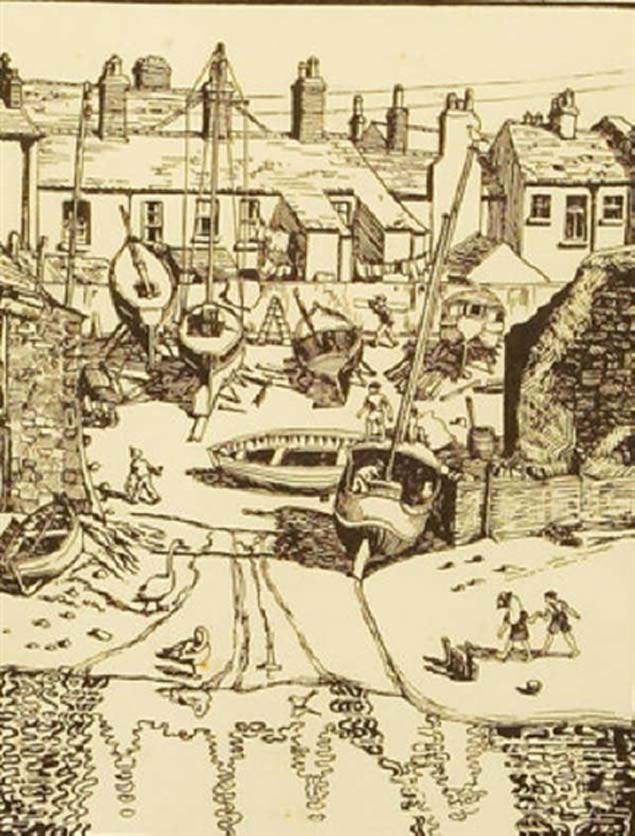 The backyard boatyards of Thorncastle Street in Ringsend as recorded by Harry Kernoff in 1940.
The backyard boatyards of Thorncastle Street in Ringsend as recorded by Harry Kernoff in 1940.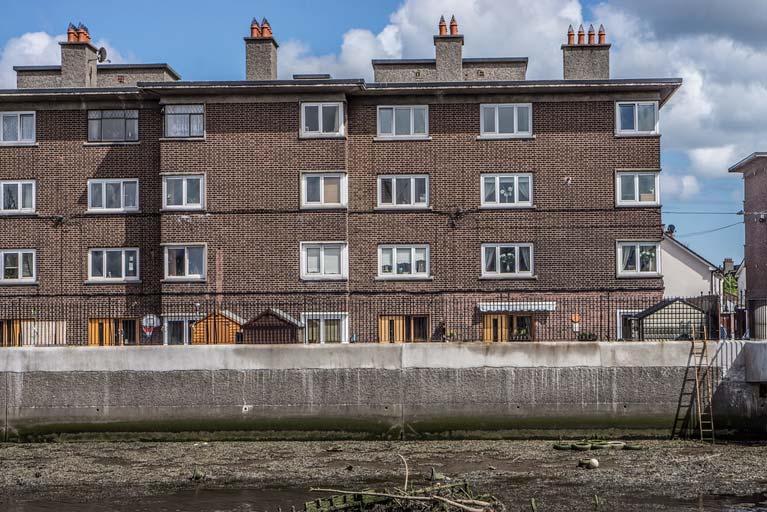 The picturesque but health-hazardous Thorncastle Street riverside houses were swept away in 1954, and the vibrant local community was re-housed in the same location in these high-specification Dublin Corporation apartments. They have well withstood the test of time while Ringsend’s relationship with the sea and boats is stronger than ever through several clubs and organisations encompassing a number of activities.
The picturesque but health-hazardous Thorncastle Street riverside houses were swept away in 1954, and the vibrant local community was re-housed in the same location in these high-specification Dublin Corporation apartments. They have well withstood the test of time while Ringsend’s relationship with the sea and boats is stronger than ever through several clubs and organisations encompassing a number of activities.
Picturesque maybe, but in terms of public health it was a disease-ridden cesspit, and in 1954 it was all swept away for a large Dublin Corporation apartment-building scheme. It was must have been a profound upheaval at the time for a long-established and close-knit community those 66 years ago, yet the job was done to a standard which meant that the flats could recently be usefully re-furbished, while other public housing schemes created new suburbs to deal with a national housing crisis.
At the time, the Irish economy was supposedly going irreversibly downhill, with rampant emigration. But the pubic projects were completed nevertheless, and while some of the new suburbs took a while to settle down and have a sense of place, the Ringsend community was retained in its heartland in those new 1954 apartments which were built to last.
A few years ago - probably well past their expected lifespan - they were given that major re-vamp, and today the place seems magic, a monument to inspired public housing and pride of place among those living there, with the old maritime community vibrantly alive in contemporary form through organisations like St Patrick’s Rowing Club, Poolbeg Y&BC, the Stella Maris Rowing Club and other sea and boat-minded groups.
Yet beyond successful schemes like Ringsend, these days - or at least until very recently - it has been the private “housing market” which is expected to solve the accommodation crisis. But the housing market has responded in the best red-in-tooth-and-claw style, with a massive build-to-rent movement throwing up new apartment blocks in which a modest two-bedroom flat is available at €3000 per month.
We’re told that these projects are on average being 70% funded by “overseas investors”. In other words, foreign loan sharks and vulture funds are ruthlessly exploiting our vulnerable seekers of reasonable accommodation.
So frankly, until we’ve a government which can show itself capable of solving this immediate challenge and also put some sort of order on the health service without bankrupting the country yet again, it’s surely premature to start beating the drum about the need for a Department of the Marine, when various private or semi-private or semi-governmental or local authority initiatives are already making a good job of moving things forward.
In fact, Governments inevitably move so ponderously slowly that the train has left by the time they realize it is departure time. Those successful Ringsend flats may have been viewed suspiciously in some quarters as being socialist or at least excessively paternalistic, yet in 2020 in the same part of town, we’re seeing a modern equivalent with the campuses being developed around the Grand Canal basins by the high-tech mega-companies to provide everything – including accommodation – for their employees.
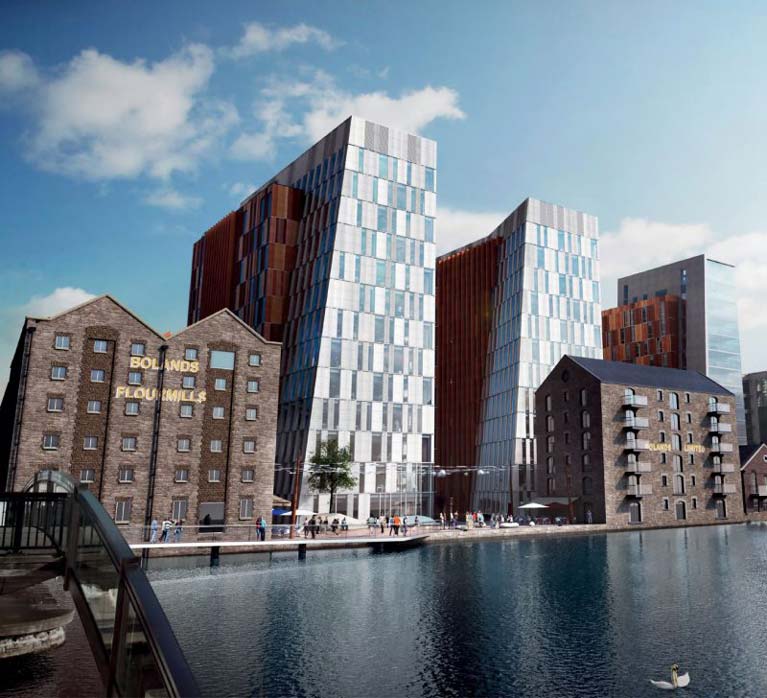 A City-Within-The-City? One solution to Dublin’s accommodation problem - the Google Campus - is taking shape beside the Grand Canal Basin to the southwest of Ringsend.
A City-Within-The-City? One solution to Dublin’s accommodation problem - the Google Campus - is taking shape beside the Grand Canal Basin to the southwest of Ringsend.
It’s not a way of life for everyone, but techies have their own way of looking at things, and they seek an environment where they can concentrate, without distraction, on what interests them. And it is all being done efficiently and in a timely manner by private enterprise in its most benevolent form.
Naturally the more traditionally-minded in Ireland will be suspicious of such things. But it’s happening, and perhaps we should give proper consideration to allow some scope for the benefits of enlightened self-interest in providing worthwhile developments in public areas which can be for the benefit of all.
The reality is that nowadays in almost every country, public-organised projects over-run in terms of time and money unless certain notably efficient contractors are involved. The National Children's Hospital is currently the most glaring case in point if we seek over-runs, but on the waterfront in the much more modest project of restoring and re-developing the Dun Laoghaire Public Baths, the time scale and ultimate shape of the finished facility are still matters of speculation.
And within Dun Laoghaire Harbour, various well-meaning groups are insisting that the ultimate flagship project, the re-purposing of St Michael’s Wharf, should not be entrusted to private developers. Yet realistic observers of such things just wonder where a well-meaning yet vague suggestion about “public benefit” will take it all.
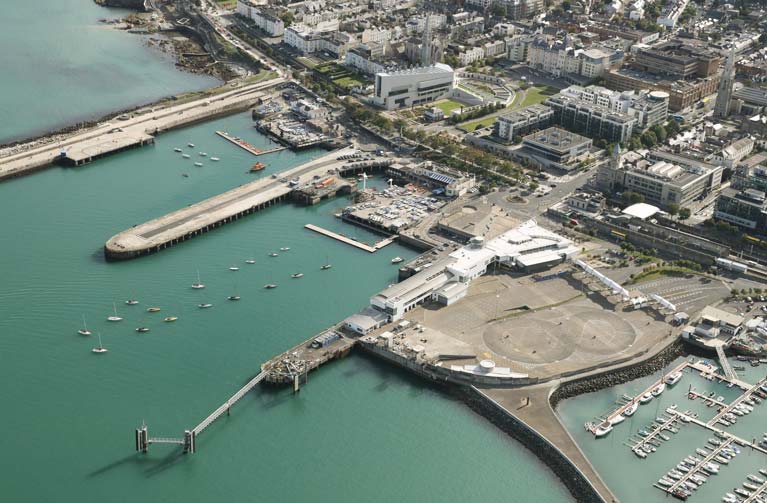 The currently vacant St Michaels Wharf and former Ferry Terminal in Dun Laoghaire dominate this photo. It is difficult to see how such a large and complex site could be best and most economically utilised by some vague general notions of “public benefit”. Photo Barrow Coakley/Simon Coate
The currently vacant St Michaels Wharf and former Ferry Terminal in Dun Laoghaire dominate this photo. It is difficult to see how such a large and complex site could be best and most economically utilised by some vague general notions of “public benefit”. Photo Barrow Coakley/Simon Coate
All this may seem a long way from the urgent need or otherwise for a revival of the Department of the Marine, but the fact is that high hopes with a vaguely inspirational name are not enough on their own to make anything worthwhile. And Sailing on Saturday reckons that the government has much more pressing problems on its plate (for we haven’t even mentioned the absurdity of mass commuting) before giving its attention elsewhere to re-establishing a Department of the Marine.
A Department to cope with the needs of a sector which isn’t doing too badly on its own initiatives and effort surely isn’t a huge priority. And anyway, in this third decade of the 21st Century, perhaps the old model of positive official and governmental encouragement no longer works.
With new ways of communication and group action, we’ve moved on and things are being done differently, so much so that you could be forgiven for fearing that if the government really does try to promote the maritime sector, it will achieve the same success as it has in reviving the Irish language.
Committee to Discuss Brexit with British Irish Chamber of Commerce & Irish Exporters Association
#Ports&Shipping - In Dublin, the Joint Committee on Agriculture, Food and the Marine will meet today (Tuesday, 13th Nov.) to discuss the impact of Brexit on agriculture, food and fisheries.
Representatives from the British Irish Chamber of Commerce and the Irish Exporters Association will appear before the Committee.
“Brexit represents a clear threat to the Irish agri-food sector and Ireland must stand ready to mitigate the negative impact on Irish agriculture and fisheries”, said Committee Chair, Pat Deering TD.
“The possibility of a no-deal Brexit is of great concern to Irish business and both the British Irish Chamber of Commerce and the Irish Exporters Association are working to ensure that the Irish Agri-food sector is as prepared as possible for whatever Brexit brings”, Deputy Deering said.
“Tomorrow the Committee will engage directly with these two bodies to discuss what needs to be done to protect Irish Agri-food; maintain markets in the UK and to develop new markets worldwide in order to reduce our dependence on the UK.”
The meeting will start this afternoon (3.30pm) in Committee Room 1, Leinster House from where proceedings can be viewed live here


























